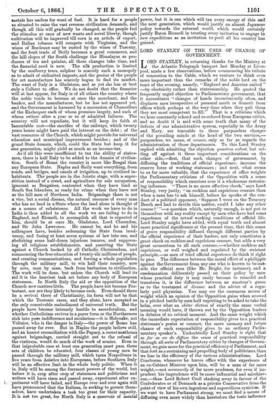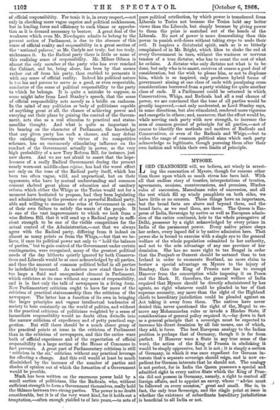LORD STANLEY ON THE USES OF CHANGE OF GOVERNMENT.
LORD STANLEY, in returning thanks for the Ministry at the Atlantic Telegraph banquet last Monday at Liver- pool, made a few observations, before commencing his tribute of veneration to the Cable, which we venture to think even more important than the remarks of the noble lord on the toast of the evening, namely, "England and America united " —by electricity rather than statesmanship. He quoted the frequently urged objection to Parliamentary government, that it necessitates "changes of hands inconveniently often, and displaces men irrespective of personal merit or demerit from offices which perhaps at the very time when they quit them they are most competent to fill." That is a criticism which we hear constantly echoed and re-echoed from European critics, and no doubt it is said with some truth that many of the defects of our administrative system, especially in the Army and Navy, are traceable to these purposeless changes of the presiding minds at the head of the two services,— purposeless, we mean, of course, only as far as regards the administration of those departments. To this Lord Stanley replied with admitting the objection quantum valeat, but set- ting off against it these important considerations on the other side,—first, that such changes of government, by diffusing the traditions of official experience, increase the reserve force of working statesmen ; and next, what seems to us far more valuable, that the experience of office weights the Parliamentary criticism of the Opposition with a sense of responsibility which exercises over it a wholesome restrain- ing influence. " There is no more effective check," says Lord Stanley, very justly, "on reckless and capricious censure than when a man has to ask himself, before he speaks of the con- duct of a political opponent, Suppose I were on the Treasury Bench and had to decide this matter, could I take any other course ? ' "—a question which, naturally enough, is not put to themselves with any reality except by men who have had some experience of the actual working conditions of official life. Lord Stanley might have added, with equal truth and almost more practical significance at the present time, that this sense of grave responsibility diffused through different parties by the official experience of their leaders, not only constitutes a great check on reckless and capricious censure, but adds a very great momentum to all such censure,—whether reckless and capricious, or well weighed and regulated by the strictest principle,—as men of tried official experience do think it right to pass. The difference between the moral effect of a philippic against the Government from any one who is known to be out- side the official area (like Mr. Bright, for instance), and a condemnation deliberately passed on their policy by men whose practical duty it may easily become to remodel and transform it, is the difference between an amateur's guess as to the treatment of disease and the advice of a regu- larly paid physician. You may see the enormous access of weight which an opinion of the Opposition gains when avowed in a pitched battle by men half expecting to be asked to take the helm, over what an obiter dictum of exactly the same verbal meaning would have, if thrown out by the Opposition leaders in debates of no critical moment. And the same weight which the immediate expectation of responsibility gives to a practical statesman's praise or censure, the mere memory and future chance of such responsibility gives to an ordinary Parlia- mentary speaker's. Undoubtedly Lord Stanley is right that so far as we do &fuse the sense of practical responsibility through all sorts of Parliamentary critics by changes of Govern- ment, we gain more for the practical efficiency of Parliament, and that both as a restraining and propelling body of politicians, than we lose in the efficiency of the various administrations. Lord Cranborne, whenever he leaves office with the experience of an ex-Cabinet Minister upon him, will be a man of far more weight,—not necessarily of far more prudence, for even if im- prudent' his imprudence will be more influential and mischiev- ous,—than Lord Robert Cecil slashing away in favour of the Confederates or of Denmark as a private Conservative from the point of view of his own ingenious and supercilious cynicism. If we want to have Parliament strong, we must find a means of diffusing even more widely than heretofore the tonic influence of official responsibitity. For tonic it is, in every respect,—not only in checking mere vague caprice and political recklessness, but in lending force and efficiency to such blame or approba- tion as it is deemed necessary to bestow. A great deal of the weakness which even Mr. Newdegate admits to belong to the present action of Parliament, is due to the absence of this sense of official reality and responsibility in a great section of the national palaver,' as Mr. Carlyle not truly, but too truly, nicknames it. In the Radical party there is little or none of this realizing sense of responsibility. Mr. Milner Gibson is almost the only member of the party who has ever reached the Cabinet, and he, being alone, has been by that means rather cut off from his party, than enabled to permeate it with any sense of official reality. Indeed his political nature is too lax and porous to serve as a good, or even respectable, conductor of the sense of political responsibility to the party to which he belongs. It is quite a mistake to suppose, as some might infer from Lord Stanley's speech, that the sense of official responsibility acts merely as a bridle on rashness. In the mind of any politician or body of politicians capable of anything great at all, the chance of achieving power and carrying out their plans by gaining the control of the Govern- ment, acts also as a real stimulus to practical and states- manlike thought. And what is quite as important in its bearing on the character of Parliament, the knowledge that any given party has such a chance, and may defeat the existing Government by virtue of its competitive schemes, has an enormously stimulating influence on the conduct of the Government actually in power, as the very high probability of a new Tory Reform Bill, for instance, just now shows. And we are not afraid to assert that the hope- lessness of a really Radical Government during the present nearly worn-out middle-class re'girne, has had the worst effect not only on the tone of the Radical party itself, which has been too often vague, wild, and unpractical, but on their opponents, who have by mutual understanding and common consent shelved great plans of education and of sanitary reform which either the Whigs or the Tories would not for a moment have hesitated to propose, had they been legislating and administering in the presence of a powerful Radical party, able and -willing to assume the reins of Government in case of their own failure to satisfy the wants of the people. It is one of the vast improvements to which we look from a wise Reform Bill, that it will send up a Radical party in suffi- cient strength to be one of the visible competitors for the actual control of the Administration,—not that we always agree with the Radical party, differing from it indeed on almost as many points as from the Whigs,—but that we be- lieve, if once its political power not only to " hold the balance of parties," but to gain control of the Government under certain contingencies, were recognized, many of the greatest political needs of the day hitherto quietly ignored by both Conserva tives and Liberals would be at once acknowledged by all parties, and thus the amount of common political belief in all parties be indefinitely increased. As matters now stand there is far too large a fluid and unorganized element in Parliament, which criticizes at its ease without any sense of responsibility, and is in fact only the talk of newspapers in a living form. Now Parliamentary criticism ought to have, far more of the criticism of practical statesmanship than the criticism of the newspaper. The latter has a function of its own in bringing the larger principles and vaguer intellectual tendencies of society to bear constantly on the world of politics, and without it the practical criticism of politicians weighted by a sense of immediate responsibility would no doubt often dwindle into the narrow criticism of expediency and of petty practical sug- gestion. But still there should be a much closer grasp of the practical points at issue in the criticism of Parliament than in the criticism of newspapers, and this the entire want both of official experience and of the expectation of official responsibility in a large section of the House of Commons in fact prevents. A great part of Parliamentary criticism is still criticism in the air,' criticism without any practical leverage for effecting a change. And this evil would at least be much diminished by the increase of the number of parties and shades of opinion out of which the formation of a Government would be possible.
Much has been written on the enormous power held by a small section of politicians, like the Radicals, who, without sufficient strength to form a Government themselves, really hold the Valance between two strong parties. The power is no doubt considerable, but it is of the very worst kind, for it holds out a temptation,—often enough yielded to of late years,—to acts of pure political retribution, by which power is transferred front Liberals to Tories not because the Tories• hold any better- views than the Liberals, but simply because by giving power- to them the prize is snatched out of the hands of the- Liberals. No sort of power is more demoralizing than this- power to punish evil-doers without taking steps to undo their evil. It inspires a dictatorial spirit, such as is so bitterly' complained of in Mr. Bright, which likes to shake the rod at every Government in turn, without the wariness or nervous. tension of a true dictator, who has to count the cost of what he ordains. A dictator who only dictates not what is to be• done, but only who is to meat, receives of course a good deal of consideration, but the wish to please him, or not to displease- him, which is so inspired, only produces hybrid forms of government aiming at one class of ends with paralyzing cross- considerations borrowed from a party wishing for quite another- class of ends. If a Parliament could be returned in which Conservatives, Whigs, and Radicals had all a real chance of ' power, we are convinced that the tone of all parties would be- greatly improved,—not only moderated, as Lord Stanley says, in some directions, but also stimulated, rendered more vigorous. and energetic in others; and, moreover, that the effect would be, while nerving each party with new strength, to increase the- area of common ground of principle fof all parties,—not of course to identify the methods and motives of Radicals and Conservatives, or even of the Radicals and Whigs,—but to widen the range of common political aims which each party acknowledge as legitimate, though pursuing them after their own fashion and within their own limits of principle.































 Previous page
Previous page